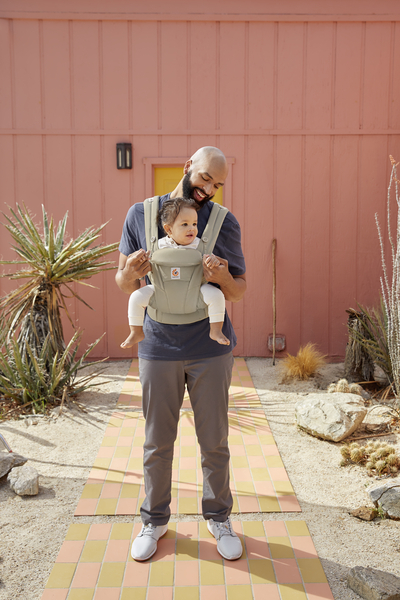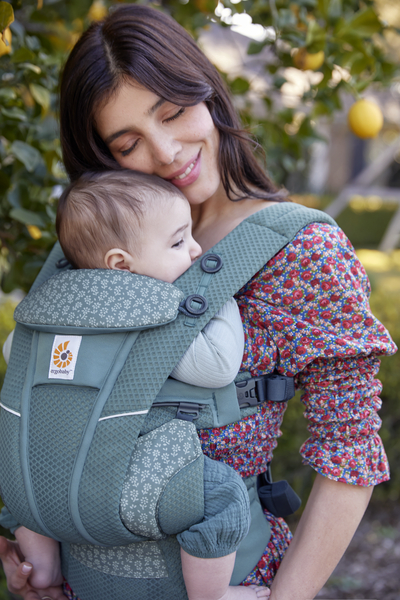
In a recent interview with Emily Little, founder of the nonprofit organization Nurturely, we explored the profound impact that babywearing can have on reducing postpartum depression. Emily’s extensive research in developmental psychology and perinatal health has led her to develop a unique approach to addressing the challenges faced by new parents, especially in underserved communities. In this blog post, we’ll delve into the benefits of babywearing for reducing postpartum depression and discuss the important work being done by Nurturely to promote this practice.
The Cultural Context
Emily’s journey into the world of perinatal health began with her international research in countries like Bolivia and Guatemala, where indigenous communities have a strong culture of babywearing. She observed how babies were constantly attached to their caregivers and how this practice was deeply woven into the fabric of society. Contrasting this with the isolated image of new parents in the United States, she recognized the cultural disparities and systemic inequities that affect postpartum mental health. This experience highlighted the significance of cultural context in understanding postpartum challenges.
 The Nurturely Approach
The Nurturely Approach
Nurturely is a nonprofit organization dedicated to promoting equity in postpartum and infant health. Their work focuses on three main areas: research, education, and community action.
- Research: Nurturely conducts community-based research in collaboration with community members to address pressing health equity gaps in the perinatal period. Their goal is to translate this research into practical tools and programs for birth workers, perinatal professionals, and anyone working with parents.
- Education: The organization equips the perinatal workforce with equity-centered education, emphasizing preventative modalities over reactive approaches to postpartum mental health challenges.
- Community Action: Nurturely’s approach is to engage all members of society in this work, emphasizing that postpartum care should be a concern for everyone. By building coalitions and involving various stakeholders, they aim to create a more supportive environment for new parents.
“You know, parents are thinking about how our doulas are becoming activists, but really it’s something that everyone should be invested in because it is the literal point of prevention and the starting point for everything that happens in society,” Emily shared.
The Importance of Babywearing
One of the key practices advocated by Nurturely is babywearing, and their research has shown remarkable results.
Emily’s most recent published study found that parents who participated in the babywearing intervention saw a significant reduction in symptoms of postpartum depression. What was even more interesting in the results is that these parents only wore their babies for an average of 1 to 2 hours per day. This relatively minimal time investment is particularly exciting because it makes babywearing accessible to parents who might not have much time or support, even if they are working or facing other challenges.
Why Babywearing Reduces Postpartum Depression
While the study didn’t delve deeply into the specific mechanisms, Emily shared that several hypotheses exist regarding why babywearing has a positive impact on postpartum depression:
- Physiological Factors: Increased physical contact through babywearing may reduce stress hormones (such as cortisol) and enhance bonding hormones (like oxytocin), improving mood.
- Reduced Crying: Babies held close in carriers tend to cry less, resulting in lower parental stress levels.
- Bonding: Babywearing facilitates a strong parent-child bond, promoting secure attachment, and healthier interactions.
- Parental Responsiveness: The practice may make parents more responsive to their baby’s needs, enhancing overall parent-child interaction.
 Cultural Change and Accessibility
Cultural Change and Accessibility
One of the challenges Nurturely has decided to face head on is changing the cultural perception of babywearing in the United States. While many parents see it as a convenient tool for multitasking, they may not realize its potential to enhance their well-being and that of their infants. The organization aims to reframe babywearing as a crucial public health intervention rather than merely a parenting accessory.
“I think we’ve gotten to a point where postpartum depression is so normalized. And while that’s good to reduce stigma around postpartum mental health challenges, it’s not ok just to say we’re never going to focus on prevention and we’re just going to accept that the word postpartum is synonymous with depression. Why are we stopping there? Why is that the reality that we are accepting? [We want to look] at prevention as something that is possible,” Emily said.
Nurturely’s work in promoting babywearing and reducing postpartum depression highlights the importance of cultural context in understanding and addressing postpartum challenges. By continuing their research and the work they’re doing in the community, they hope to create a cultural shift where babywearing is recognized and valued for its potential to improve the mental health and well-being of new parents. It’s a journey toward a healthier and more supportive postpartum experience for all.
If you want to learn more about their study, you can read all about their process and findings here.

 The Nurturely Approach
The Nurturely Approach Cultural Change and Accessibility
Cultural Change and Accessibility

